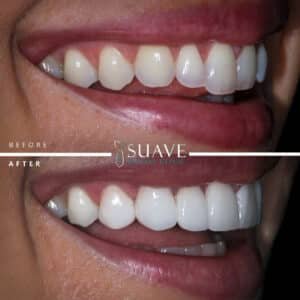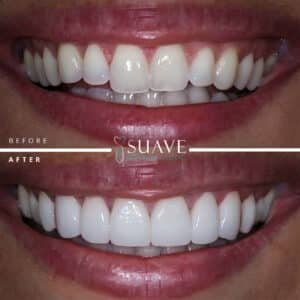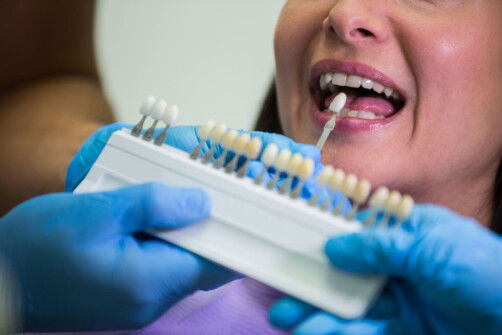Table of Contents
Do you want to enhance your smile with dental veneers? Does this yellowish, discolored tooth disturb your appearance? The long dental procedure does not fit your schedule, does it?!
Here at Sauve Dental Clinic, we will brush your doubts away. Let me walk you through dental veneers, why you probably need them, and how to get a dental veneers procedure in Turkey.
What Are Dental Veneers?
Dental veneers are thin, custom-made, highly esthetic, natural-looking, shells of tooth-colored materials designed to cover the front surface of teeth to improve their appearance. They’re typically made from ceramics, porcelain, or composite resin and are permanently bonded to your teeth, as we will discuss the difference between all the veneer materials.
Dental Veneers procedures become a popular solution for dental treatments, for high-quality material and an outstanding smile.


Who is a Good Candidate for Dental Veneers?
You know you need veneers when;
- If Your front teeth – including incisors, canine, and premolars, and usually the first molar may appear in your smile too – suffer from untreated discoloration by Teeth whitening.
- Misshapen teeth that are unsymmetrical with your smile.
- You have chipped or cracked teeth.
- Closing of diastemas (gaps) discomfort your appearance
- Lengthening anterior teeth.
- Improvement of the appearance of rotated or malaligned teeth (served as a solution if the patient can’t afford an orthodontic procedure).
When should you not get veneers?
You are contraindicated to do dental veneers when :
- There is little or no enamel, so a full crown should be considered.
- tooth-to-tooth habits like bruxing, clenching, or parafunctional habits that could damage your tooth structure, like pencil chewing, ice crushing, or using teeth as a tool to open a bottle or to cut off a price tag.
- Teeth that exhibit severe crowding and need orthodontic treatment prior to veneers.
- Certain types of occlusion problems such as class III and end-to-end bites.
- Severe tooth decay or cavity.It’s important that you have generally good oral health and consult your dentist to know whether you need any further procedures before this decision.
Dental Veneers: Advantages and Disadvantages
| Dental Veneers Advantages (Pros) | Dental Veneers Disadvantages (Cons) |
|---|---|
|
|
How Many Types of Veneers Are There?
The proper formulation of each veneer contributes largely to the final functional and esthetic outcome of the restorative work.
There are many types of dental veneers regarding the material type, and the technology applied to manufacture the veneers :
Dental veneers regarding the material types:
- Composite veneers
- Porcelain laminate veneers
- Zirconia or layered veneers.
- Lithium disilicate or silicate substructure
- Hybrid veneers
- Ceramic veneers – the most popular: Vita EMAX and Vita ENAMIC
Dental veneers regarding the technology used in manufacturing inside the dental labs:
- Compressed Glass Ceramics
- Layered Ceramics
- Minimally Invasive CAD/CAM technology – the most used
- Dental Lumineers (extra thin, highly translucent variant of veneers)
Dental veneers regarding the veneer’s thickness and the tooth preparation design:
- Feather Preparation: Minimally invasive tooth preparation: 0.3mm – 0.5 mm of tooth structure
- Bevel Preparation: more control over the incisal aesthetic, consider also minimally invasive tooth preparation: 0.5mm – 1 mm of tooth structure
- Incisal overlap and proximal wrap: consider more invasive.
- No-prep veneers – the least applicable
How Do Veneers Work?
Dental veneers’ main purpose is to provide a permanent high esthetic coverage of the front surface and may extend to the incisal edge of your teeth or in some extensive cases it also covers the palatal /lingual surface.
It works by providing a natural-looking mask of the teeth’s imperfections.
How it’s done step by step
- Consultation and planning
- Preparation of the tooth surface
- Trying on provisionals appearance and functionality
- Bonding the veneers to your teeth
Dental Veneers Process at Suave Dental Clinic
At Sauve Dental Clinic, we affirm and reaffirm during the multiple steps of the dental veneers procedure that veneers have to be aesthetically pleasing, and we are capable of doing so during the provisional try-on, and after the final adherent.
Here are the clinical steps of dental veneers:
Additional Services provided with Dental Veneers:
- Local Anesthesia.
- Free Panoramic X-Ray.
- Free Teeth Extractions.
- Private Language Assistant.
- Transportation Airpot-Hotel-Clinc-Airport.
Get A Free Dental Consultation
Get A Personalized Treatment Plan and Quotation
How Much Do Dental Veneers Cost?
According to Healthline dental veneer cost per tooth in the USA starts from 925$ to 2500$. In the UK it starts from 500$ to 1900$. Furthermore, dental veneers are cosmetic dentistry treatments as a result it’s not covered by insurance. And paying around 10,000$ to get a confident Hollywood smile is too much. That’s why last year people prefer to have dental veneer in Turkey. In Turkey dental veneers cost start with 250$ up to 500$ depending on the material and the type of veneers you want.
The Most Important Frequent Questions about Dental Veneers
Does Insurance Cover Veneers?
Generally, dental insurance doesn’t cover veneers as they’re considered a cosmetic procedure. However, it’s always best to check with your private insurance provider for details, or contact us, to help you get the best-tailored treatment plan at an affordable price.
How Long Do Teeth Veneers Last?
With proper oral hygiene and dental aftercare, dental veneers can last 10-15 years, Composite veneers typically last 5-7 years, before needing replacement.
What Happens To Teeth Under Veneers?
Your natural teeth remain largely intact underneath, but a small amount of enamel is removed to make room for the veneers. The teeth are protected by the veneers but will always need a covering.
Can You Go Back To Normal Teeth After Veneers?
Unfortunately, the process is irreversible. Once your teeth are prepared for veneers, you can’t go back to your original teeth. However, unlike crowns, preparation for veneers only shave 0.3mm to 1mm of your teeth.
Are Veneers Painful To Get?
The procedure itself is usually not painful as free local anesthesia is used. Some patients may experience temporary sensitivity after the procedure but it’s usually tolerable.
